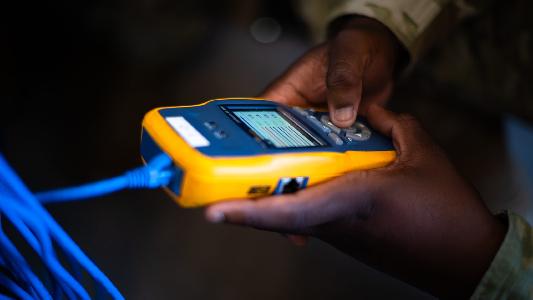Artificial intelligence tools are revolutionizing our workplaces so quickly that it’s comparable to the printing press.
HR professionals’ primary goal is to create a workplace where employees and the organization can thrive. That means we must constantly adapt to the evolving technology landscape — and right now, like with Johannes Gutenberg’s famous tech, changes are happening at lightning speed.
Thanks to my position, I know first hand that AI is already massively shifting how companies recruit, onboard, develop and retain talent.
Especially in small to medium businesses, where HR teams often wear multiple hats and resources are limited, AI integration offers a transformative opportunity to streamline operations, enhance employee experiences and drive organizational success.
That said, integrating AI into day-to-day HR operations must be strategically planned. It’s essential to approach the transition thoughtfully, ensuring it complements human expertise rather than replaces it.
Let’s dive deeper into what this transformation means going forward.
Providing instant support and automating routine tasks
Gone are the days of sifting through mountains of paperwork and emails. For companies with lean HR teams, managing day-to-day operations efficiently is paramount.
With the current natural language processing capabilities, AI-powered chatbots can handle employee inquiries related to benefits, policies and payroll, freeing HR professionals to focus on strategic initiatives while still ensuring timely responses to queries — and enhancing overall satisfaction.
Letting employees take control of their info
Sometimes an email inquiry and response isn’t even necessary, thanks to AI-driven self-service platforms that enable staff to access information and resources independently, reducing the burden on HR personnel.
Through intuitive interfaces and predictive analytics, these platforms can offer personalized guidance on policies, procedures and compliance requirements. This not only frees up resources but also empowers employees to take control of their HR-related tasks, ultimately driving organizational efficiency and agility.
Onboarding new hires — and keeping them engaged
Effective onboarding is essential for integrating new hires into a company culture and ensuring their long-term success. AI can streamline this process by delivering personalized experiences tailored to each new employee’s role and preferences.
With interactive training modules and virtual reality simulations, AI technologies can immerse new hires in their roles, accelerating learning and fostering a sense of belonging. Moreover, AI-powered platforms can provide ongoing support and recognition, keeping employees engaged and connected with their teams.
Uncovering data-driven insights on employee satisfaction
At small to medium businesses, where every employee’s contribution is significant, prioritizing the employee experience is a major priority.
By analyzing data points such as engagement surveys, performance metrics and sentiment analysis, AI algorithms can uncover insights into employee satisfaction and identify areas for improvement. Investing in the employee experience with this data-driven approach can enhance retention, productivity and overall organizational performance.
Boosting retention by being proactive
Employee turnover can cost organizations a lot. Turns out AI can help predict (and prevent) voluntary turnover by analyzing factors like job satisfaction, engagement levels and historical data on employee attrition.
By identifying at-risk employees with these tools, HR professionals can proactively implement targeted retention strategies like personalized career development plans, mentorship programs or flexible work arrangements. AI-driven tools can also help identify underlying issues and trends affecting employee morale so HR teams can take proactive steps to address them, fostering a positive work environment and enhancing retention overall.
Before you go...
Please consider supporting Technical.ly to keep our independent journalism strong. Unlike most business-focused media outlets, we don’t have a paywall. Instead, we count on your personal and organizational support.
3 ways to support our work:- Contribute to the Journalism Fund. Charitable giving ensures our information remains free and accessible for residents to discover workforce programs and entrepreneurship pathways. This includes philanthropic grants and individual tax-deductible donations from readers like you.
- Use our Preferred Partners. Our directory of vetted providers offers high-quality recommendations for services our readers need, and each referral supports our journalism.
- Use our services. If you need entrepreneurs and tech leaders to buy your services, are seeking technologists to hire or want more professionals to know about your ecosystem, Technical.ly has the biggest and most engaged audience in the mid-Atlantic. We help companies tell their stories and answer big questions to meet and serve our community.
Join our growing Slack community
Join 5,000 tech professionals and entrepreneurs in our community Slack today!

The man charged in the UnitedHealthcare CEO shooting had a ton of tech connections

From rejection to innovation: How I built a tool to beat AI hiring algorithms at their own game

The US needs to train more cyber talent to keep the country secure




